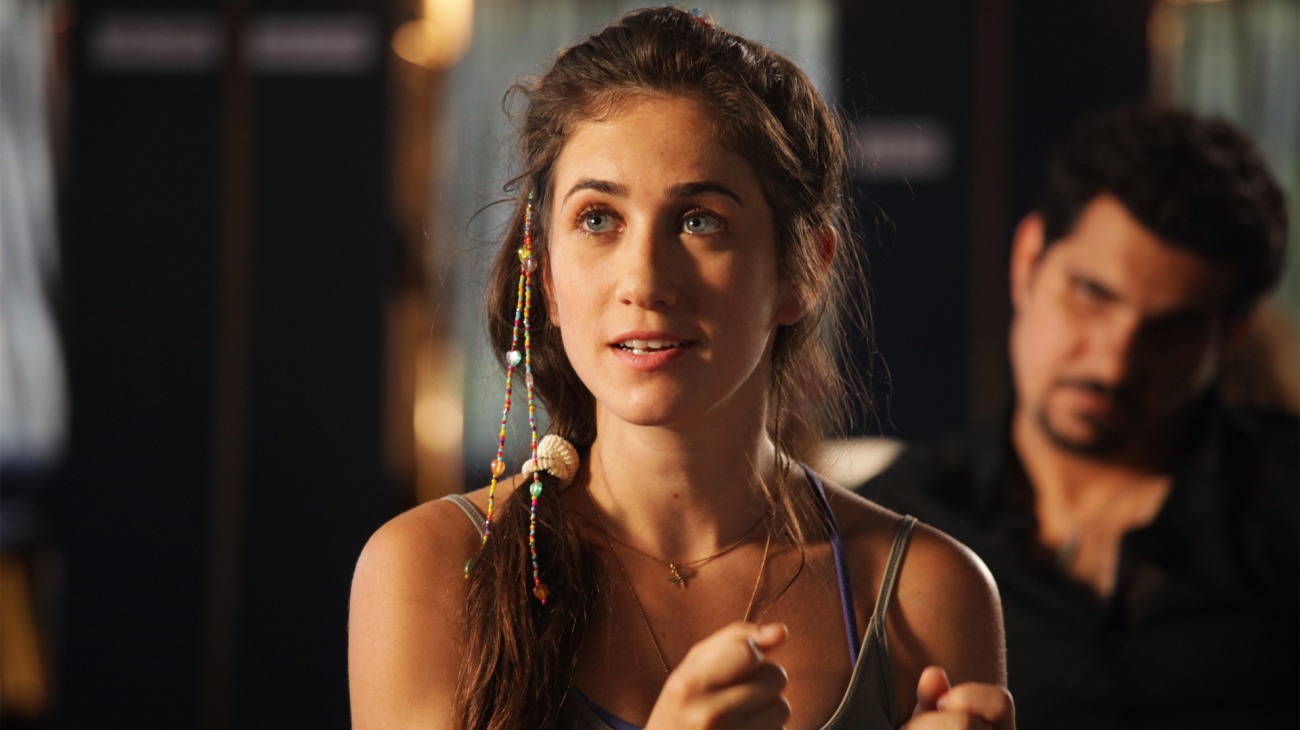
The 48th Chicago International Film Festival
Screens at CIFF: 10/18 & 10/20 & 10/22
World premiere: 14 June, 2012, Israel
If you have ever heard of the Israeli comedy trio Gashash, you're one up on me, both as a student of important cultural touchstones throughout the world, and as concerns Shemi Zarhin's hugely successful film The World Is Funny - recipient of a record-setting 15 Ophir nominations (the most prestigious Israeli film award) - which takes its name from a Gasash catchphrase that, we are assured by an opening title card obviously slapped on solely for a foreign audience, has become a statement used in Israeli daily life, "The world is funny, so I laugh". The implication being that, although everything is too terrible and absurd to make sense of it, it makes more sense to rise above it through laughter than sink into it with furious raving about how much things suck and need to be changed.
That is a lesson which much badly needs to be learned by the three people at the center of the film's sprawling, interconnected cast. Yardena (Assi Levi) has some time ago lost her adult daughter to a military accident, and deals with this using a kind of scorched-earth policy of emotions that make it difficult for anyone to talk to her about anything, and has by the time we meet her turned her marriage into a shell; and she's also just learned that she's pregnant, despite being absolutely certain that she hasn't had sex with her husband or anyone else since long before the time conception must have occured. Meron (Dani Shteg), is a caustic, arrogant man with two teenage sons, one a disaffected punk named Hillik (Or Ben-Melech), and another, Nessi (Mosh Ashkenazi), who has been in a coma for years, and just woken up, a psychological ten-year-old in the body of a young man just shy of his nineteenth birthday. And Golan (Eli Finish), a radio host and huge Gashash fan who broadcasts one of their classic sketches on his show every Tuesday afternoon in what has become a highly-anticipated shared ritual for all the people in town, is watching his girlfriend, Natasha (Ola Schor), die of cancer that has progressed into her brain and affected the systems responsible for controlling emotions, leading her to spontaneously lash out in savage, condescending anger just minutes in the midst of otherwise normal, loving moments. The three of them - who we learn, quite casually about 15 minutes in, are siblings - all live in the town of Tiberias, which we are further informed has an important metaphorical connotation via Gashash's comedy as the place where dim but well-intentioned people live, trying to make it through the travails of the everyday in their bumbling way.
And if that suggests a vastly more comic vision of humanity than the mordant, dramatic The World Is Funny presents - though given how much I, personally, didn't understand how the numerous snippets of Gashash material we see or hear in the film is meant to be funny in any way, shape, or form, it's clear that I'm not on the wavelength of Israeli humor and thus perhaps the film is a non-stop laugh riot - the more important element of that equation is that these people, in all their fumbling, really do just want to find that little bit of peace and happiness, and if the film is awfully serious, it is also awfully humane, taking its cluster of broken, unhappy people and treating them with real generosity and love; no arch film about the foibles of humanity this, but a a sweet and giving story of how people, when given enough chances, will eventually correct all of the bad decisions they've made in life. Zarhin does not want us to think too harshly of these people and their bad choices, but find in them a hopeful reflection of ourselves, and our ability to recover from trauma.
If this theme is approached quite overtly - between the boy coming out of a coma and the woman fighting cancer, the healing imagery is certainly not trying to hide itself - it is, at least, approached crisply and without too much leaning on the audience to make sure we "get it", and in fact one of the most appealing things about The World Is Funny is that it presents a whole lot of material in the faith that we'll be able to connect all the dots on our own, both in terms of the narrative (where we often have to be several scenes in advance of where the characters "officially" are, in order for everything to makes sense), as well as theme, where we're encouraged to see the symbolism of things like healing and reconciliation and reunion without necessarily being hammered in the face about them (although the subplot about Golan wanting desperately to bring the two surviving members of Gashash back together one last time does err on the side of "yes, we get it" once or twice).
Simply put, it's a smartly-written, cleanly-directed movie about people and their lives, acted with across-the-board terrific acting to make those people seem as interesting as possible. Cultural specificity notwithstanding, it's the kind of straightforward movie that's just really damn strong, anywhere in the world that humans make mistakes and learn from them.
8/10
World premiere: 14 June, 2012, Israel
If you have ever heard of the Israeli comedy trio Gashash, you're one up on me, both as a student of important cultural touchstones throughout the world, and as concerns Shemi Zarhin's hugely successful film The World Is Funny - recipient of a record-setting 15 Ophir nominations (the most prestigious Israeli film award) - which takes its name from a Gasash catchphrase that, we are assured by an opening title card obviously slapped on solely for a foreign audience, has become a statement used in Israeli daily life, "The world is funny, so I laugh". The implication being that, although everything is too terrible and absurd to make sense of it, it makes more sense to rise above it through laughter than sink into it with furious raving about how much things suck and need to be changed.
That is a lesson which much badly needs to be learned by the three people at the center of the film's sprawling, interconnected cast. Yardena (Assi Levi) has some time ago lost her adult daughter to a military accident, and deals with this using a kind of scorched-earth policy of emotions that make it difficult for anyone to talk to her about anything, and has by the time we meet her turned her marriage into a shell; and she's also just learned that she's pregnant, despite being absolutely certain that she hasn't had sex with her husband or anyone else since long before the time conception must have occured. Meron (Dani Shteg), is a caustic, arrogant man with two teenage sons, one a disaffected punk named Hillik (Or Ben-Melech), and another, Nessi (Mosh Ashkenazi), who has been in a coma for years, and just woken up, a psychological ten-year-old in the body of a young man just shy of his nineteenth birthday. And Golan (Eli Finish), a radio host and huge Gashash fan who broadcasts one of their classic sketches on his show every Tuesday afternoon in what has become a highly-anticipated shared ritual for all the people in town, is watching his girlfriend, Natasha (Ola Schor), die of cancer that has progressed into her brain and affected the systems responsible for controlling emotions, leading her to spontaneously lash out in savage, condescending anger just minutes in the midst of otherwise normal, loving moments. The three of them - who we learn, quite casually about 15 minutes in, are siblings - all live in the town of Tiberias, which we are further informed has an important metaphorical connotation via Gashash's comedy as the place where dim but well-intentioned people live, trying to make it through the travails of the everyday in their bumbling way.
And if that suggests a vastly more comic vision of humanity than the mordant, dramatic The World Is Funny presents - though given how much I, personally, didn't understand how the numerous snippets of Gashash material we see or hear in the film is meant to be funny in any way, shape, or form, it's clear that I'm not on the wavelength of Israeli humor and thus perhaps the film is a non-stop laugh riot - the more important element of that equation is that these people, in all their fumbling, really do just want to find that little bit of peace and happiness, and if the film is awfully serious, it is also awfully humane, taking its cluster of broken, unhappy people and treating them with real generosity and love; no arch film about the foibles of humanity this, but a a sweet and giving story of how people, when given enough chances, will eventually correct all of the bad decisions they've made in life. Zarhin does not want us to think too harshly of these people and their bad choices, but find in them a hopeful reflection of ourselves, and our ability to recover from trauma.
If this theme is approached quite overtly - between the boy coming out of a coma and the woman fighting cancer, the healing imagery is certainly not trying to hide itself - it is, at least, approached crisply and without too much leaning on the audience to make sure we "get it", and in fact one of the most appealing things about The World Is Funny is that it presents a whole lot of material in the faith that we'll be able to connect all the dots on our own, both in terms of the narrative (where we often have to be several scenes in advance of where the characters "officially" are, in order for everything to makes sense), as well as theme, where we're encouraged to see the symbolism of things like healing and reconciliation and reunion without necessarily being hammered in the face about them (although the subplot about Golan wanting desperately to bring the two surviving members of Gashash back together one last time does err on the side of "yes, we get it" once or twice).
Simply put, it's a smartly-written, cleanly-directed movie about people and their lives, acted with across-the-board terrific acting to make those people seem as interesting as possible. Cultural specificity notwithstanding, it's the kind of straightforward movie that's just really damn strong, anywhere in the world that humans make mistakes and learn from them.
8/10






